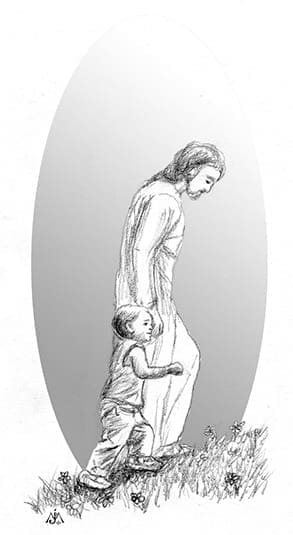A plant, a rabbit and a lesson about mercy
By LORRAINE V. MURRAY, Commentary | Published September 4, 2020
Someone gave me a hibiscus plant last fall, which sported bright yellow flowers. I babied it all winter to keep it healthy and when spring came, I put the plant outdoors to get more sunlight.
How proud I was to see the plant sitting on the front porch with vibrant, shiny leaves and clusters of promising buds.
And then a rabbit ate it.
I refused to give up, however, so I brought the nub inside and watered it faithfully, and soon little tendrils of green re-appeared. When it seemed healthy, I put the plant outside again, figuring the rabbit wouldn’t strike twice.
But he did.
It’s tempting to give up on projects like this. After all, I could just go to a gardening store and buy another plant. Why put in all the trouble?
I see this little saga of the hibiscus symbolizing the way God treats us. Sometimes we are thriving and ready to burst into bloom with some new project, a promising job, a lovely relationship—and then something comes along and nips our plans in the bud.
 Perhaps we were struggling with an addiction and had discovered a group to help us overcome it. Perhaps we were sinking in a troubled marriage, but counseling was helping us.
Perhaps we were struggling with an addiction and had discovered a group to help us overcome it. Perhaps we were sinking in a troubled marriage, but counseling was helping us.
And then, out of the blue, everything goes awry. The addict succumbs to temptation, the marriage suffers a crashing blow.
We fall down over and over, just like little children do, but Jesus is so patient with us. He will take our hand and lead us to safety. And he assures us he will forgive us endlessly.
We see this mercy in the story of Mary Magdalene, who had seven demons cast out of her heart and later received the huge honor of being first to encounter the risen Christ.
We see this mercy in the story of the repentant thief dying next to Jesus, who was given a last-minute promise of heaven.
It’s tempting to think Jesus only wants perfect people around him, the ones with halos and uncheckered pasts, but he didn’t ask that of anyone. The people who sought him out begged him to heal their imperfections.
We are called to be merciful to others, just as God shows us mercy. St. Nikolai wrote, “One day I saw a poor man begging, and the face of Christ shone above his head! Just then, a passerby gave the beggar a piece of bread, and I saw the Lord extend his hand, take the bread, and bless the donor.” Because of this vision, he said, “I perform as much charity as I can.”
Now, more than ever, we need to recognize Christ in others. Many people are engulfed in fear, and many are struggling financially. They need prayers and encouragement, they need charity—and in the days of social distancing, they long for spiritual closeness.
The hibiscus plant is back in my house, under a grow light, and its limbs are clothed in silky green finery. I have no plans to return it outside, lest it again become a feast for that hungry rabbit.
Instead, I am keeping it safe and nurturing it carefully. It’s been through a struggle and suffered setbacks, but that’s all in the past.
Now the little plant is basking in the merciful light that overcomes darkness. And just as God’s love heals us and gives us strength to start again, I believe this plant will thrive and one day produce flowers the color of the sun.
Artwork is by Lorraine’s late husband, Jef Murray. Her email address is lorrainevmurray@yahoo.com.